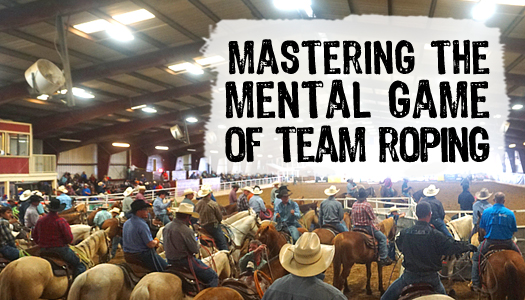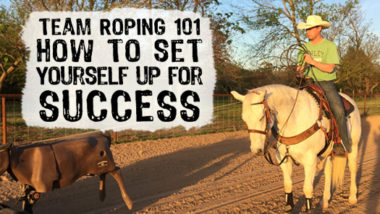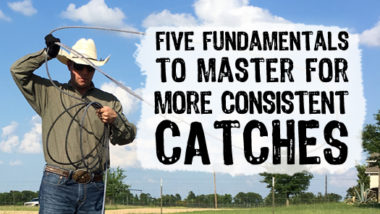Listen to this article in audio form! It’s #8 in the Team Roping Tips Podcast.
For the latest episodes subscribe on iTunes or your favorite podcast app.
Have you every struggled with your roping, then let the frustration get to you so much that it caused things to fall apart even more?
Or have you ever let out of balance emotions triggered by a sub-par performance influence how you treated others, your horses, or negatively impact your outlook in general?
I’ve certainly been there, I’m sure we all have – but the ability to control our thoughts and self-talk is a skill we must develop if we want to stay progressive and bounce back quickly when a performance doesn’t go the way we intend.
There are so many factors we can’t control in team roping. But the good news is that we literally get to choose how we perceive our results, regardless of whether the world tends to view them as ‘good’ or ‘bad.’
The only meaning anything has is the meaning we give it. It’s completely within our control.
It serves our roping, our loved ones, and everyone & everything around us if we intentionally ‘flip the script’ and assign meaning to things that empowers us vs. the opposite.
As an example, many years ago Gus was a horse I purchased while attending college that didn’t have much team roping experience, but was a finished tie-down roping horse. He could really run and I was excited to finish him in a way that fit my roping style.
We ran a lot of steers in the practice pen, and at team ropings and rodeos, but I was really struggling with my dallying and lost my rope a lot when I rode him.
I tried to excuse it as a temporary problem at first, but it continued and got worse to the point that I was getting frustrated, embarrassed, depressed, and unconfident in my roping.
Up to this point in my career, I had a lot of confidence in my roping when I was riding any of my other horses.
But every time I backed in the box, I would develop a lot of anxiety and tension in my body because I was unsure if I was going to get my dally or not.
About half the time I was successful and the other half not. I was constantly beating myself up mentally. When I did make successful runs, I felt like it was because I got lucky.
At this point, because the negative self-talk had gotten so out of hand, I was roping not to lose, more than I was roping to win, and lost my rope several times for a chance to win some very big team ropings.
During this time, I’ll never forget when the 1991 World Champion Bobby Harris asked me to head for him at a big open roping. I only knew Bobby from a few of his schools I attended shortly before. All I remember telling myself was “Don’t lose your rope.”
We won the first round, but I lost my rope on our second steer. It was my dream and goal to rope in big ropings like that with great heelers. I was really disappointed in myself for throwing away a big opportunity.
I allowed the stories in my mind continue to the point that it affected my attitude and my actions in and out of the arena. Sometimes even to the point of blaming my horse and taking it out on him.
I knew something had to change if we were going to keep roping and be a consistent, successful team. I had to really dig deep and admit to myself that the thoughts going through my head were limiting me.
Maybe you can relate to this story. Looking back, I know now that when we’re struggling with something, we get to decide the meaning behind it. A ‘bad’ day of roping simply might mean we need to make some adjustments in the practice pen to get back on track.
Struggling or being challenged by something doesn’t have to define our ability. How we handle it, however is very likely to define how soon we get to the other side of that challenge. It’s just temporary.
“There is no failure, only feedback.”
We don’t have to identify with it or become it, or let it impact us emotionally at all. We can choose to stay neutral.
To take this as far as we can in the opposite direction, consider this – every time you bump up against some kind of challenge related to your roping, you’re fixing to learn something that will ultimately help you be better. The best in the world are the best because they’ve experienced a lot of challenges – and then overcome them.
‘Failure’ isn’t the opposite of success, it’s part of success.
Instead of getting frustrated, get curious… get fascinated! If you feel inspired to achieve big things, you’ve got to have faith and patience in the process – that it’s all unfolding as it should and that you’re constantly presented with opportunities to learn and grow that will support your on-going, long term success.
A smooth sea never made a skilled mariner. Every mistake is one you never have to make again, that’s something to get excited about!
No matter what happens, it’s up to us to decide how to interpret any situation we encounter. We get to assign meaning to everything that happens, so why not assign meaning that supports, encourages and empowers us to be at our best?
In my case, I was allowing the negative self-talk to define my ability as a team roper and limit my success. Being able to identify our need for a stronger mental game is the fist step in creating change. This will require removing any barriers that are holding us back from having a strong mental game and then doing the inner work and adapting habits to support it.
This could include associating with different people that encourage and support us, as well as seeking outside resources to confirm new, positive perspectives, such as podcasts or books to educate ourselves with techniques to encourage and solidify our mindset and beliefs.
Outside of catching those negative thoughts and stories in our mind and choosing a different mental path, is making the firm personal realization that our best is always enough. This can give us a lot of peace and really keep us even-keeled without becoming a victim on an emotional roller coaster.
The truth is, all we can ever do in any competitive situation is our best at the given time. No matter what kind of results we end up with, if we can look back and know in our heart we gave our preparation and performance our very best shot, we can have satisfaction and contentedness in that with no regrets, what-if’s or frustration regardless of the results.
We can’t do more than our best. But here’s the thing – can you honestly say that you ARE doing your best? If not, what’s in the way of that? What has to change in your life so that you can truly apply yourself to the best of your ability? If I can’t give my best to preparing my horse and myself to compete, I won’t enter. Anything worth doing is worth is worth doing to the best of our ability.
Looking back, I knew I needed to work on my horse to correct the problem he’d developed with ducking out and I didn’t do it. I wasn’t taking the right, consistent action steps to resolve the issue at it’s source. It wasn’t my best and I do carry some regret over those ropings I should have won.
A few years later at the USTRC Finals in Oklahoma City, Gus and I were about to run the most important steer of our lives in the chute-out round coming back second high call. As I watched he first 18 teams run their steers, I remember sitting there behind the chute watching the score, and remaining calm yet optimistic.
My partner and I had worked on all aspects of our roping and simulated this roping several times before we left Wyoming headed to Oklahoma. All that preparation was as much about working on our mental strength as it was our roping fundamentals.
We were fortunate to win Reserve Champions that day, but no matter what had happened on our last steer, we would have been able to ride out of the arena knowing we did everything we could to give ourselves a chance of winning. I had no ‘coulda – shoulda – woulda’s’ about not winning first that day. I had done my very best to prepare.
If you take shortcuts, skip practice, short change your horse in some way, that’ll haunt you – you’re living out of alignment and expecting a big return on a minimal investment. But win, lose or draw, you can have peace (and easily remain emotionally stable) if you’ve done everything you could do to prepare. That’s having personal integrity, and is something only you can know.
There are a lot of factors we can’t control in a run, or about our circumstances. However, we are always in control of our thoughts, and can choose our perspective and our attitude – and make sure that we choose empowering ones that impact us, our roping and everyone we come in contact with in a positive way.
Then just like our roping, once we’re committed to this, we get better and better at it with consistent practice.
If you’d like more support beyond what I shared today, click here to learn about video coaching and be sure you’re subscribed to receive new roping tips when they’re published here at CraigSmithTeamRoping.com.


